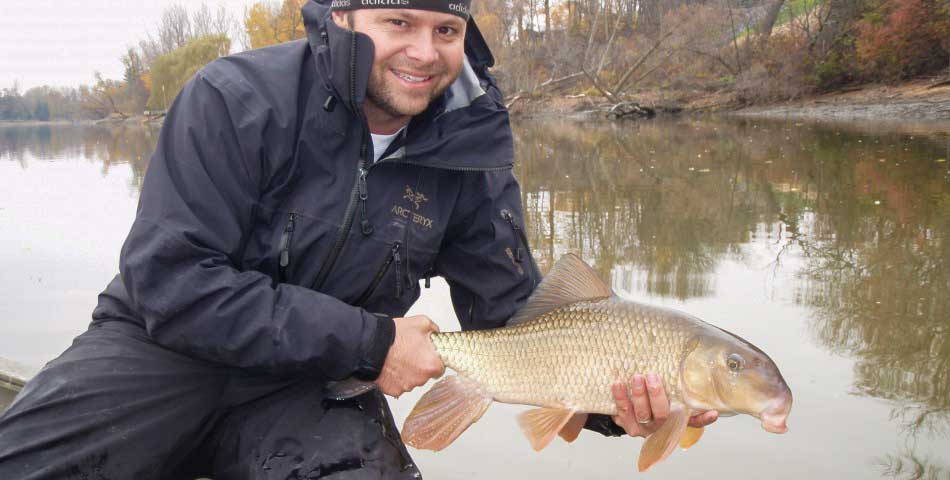OTTAWA – The Ontario angler survey from Carleton University researchers, as shared in the August 20, 2020 edition of The Expositor, has concluded and its preliminary results indicate that the COVID-19 pandemic has not had any massive impacts on anglers’ fishing habits when compared to the same time a year before, though the researchers note that the sampling method may be a significant factor toward that outcome.
“Fresh air and getting outside is really important during these times and I think fishing is a good and safe way to do that,” said researcher Dr. Steven Cooke, a member of the study team.
The full results of the study are presently in a preprint phase. The team chose to release them before the peer-review process finished because some of the research pertained to public health guidelines and government messaging during the pandemic, information that could benefit officials during the ongoing second wave.
Dr. Cooke said he was surprised that survey-takers seemed to not change their fishing behaviour much from pre-pandemic to mid-pandemic timeframes, but he said this may be attributable to the ‘snowball’ style of the survey.
To spread awareness of the project, the researchers asked survey respondents to forward it to their friends and colleagues. The project also made several appearances in online fishing-related forums.
This meant those who responded tended to be people who already engaged more with fishing-related content online and were more avid anglers on the whole. Number of days fished was only one lower during the pandemic when comparing the same timeframe in 2019 and 2020.
‘If we’re bolder with management actions and willing to try something new, I think we could have really impressive fisheries here in Ontario.’
–Dr. Steven Cooke,
Carleton University biologist
While there was a lot less fishing pressure on water bodies this year, Dr. Cooke said this was because of a drop in international anglers.
“I can’t begin to predict how many American tourists visit Manitoulin each year, but in eastern Ontario, there’s a massive influx in the spring—you can tell by the boat licence (numbers),” he said.
One expected trend that Dr. Cooke did not see was a substantial increase in fish harvest.
“I thought people would be saying, ‘well, if I’m going fishing and supposed to be staying home from grocery stores or am tired of only eating things in grocery stores, here’s a cheap way for me to get some good, clean, healthy, safe and tasty protein.’ But there was no major uptick in fish harvest, so people were still catching and releasing fish at quite high rates,” he said.
Other responses were more closely aligned with expectations, such as people’s spending habits remaining relatively steady.
“People continue to spend money on fishing—that’s what anglers do. If they can’t fish, they’re buying gear,” he said.
According to the results, people were most likely to support small, independent local tackle shops over foreign and big-box retailers, something that was of comfort to Dr. Cooke who was concerned about those stores’ viability through the pandemic.
His team plans to continue researching during the pandemic, including trying to get access to fishing app records for a broader data set.
Last year, the research group took advantage of the lower international pressure and did snorkeling surveys on nesting bass in lakes that normally draw a lot of US tourists.
“We saw the lowest level of hook wounding (because you can often see bruises on the upper jaws of bass on their nests) and the highest level of reproductive success that we’ve recorded in the past decade. That relaxation of fishing pressure really benefited the bass population,” he said.
Lessons such as that survey offer opportunities for governments to re-evaluate how they manage fisheries. He said the results may support a case for designating small portions of fished waterways, such as a bay or two in a lake, as fish sanctuaries.
“What if we did set aside 10 or 20 percent of our fished waters?” he asked, reflecting on the decline in the fishery’s quality over the past decades. “If we’re bolder with management actions and willing to try something new, I think we could have really impressive fisheries here in Ontario.”
The preprint survey went to the journal Fisheries Research in late November, as well as the Ontario Ministry of Natural Resources and Forestry and Ontario Federation of Anglers and Hunters.
Dr. Cooke said the survey would provide data to hopefully encourage more people to experience fishing in the coming year, while health restrictions are still in place.
“I still believe fishing is a safe and important activity that can be done during a pandemic, as long as you stay close to home, make sure you’re spread out and don’t squeeze into an ice hut with 20 friends,” he said. “Fresh air and getting outside is really important during these times and I think fishing is a good and safe way to do that.”
To read the preprint of the survey, visit
ecoevorxiv.org/87qh9.




